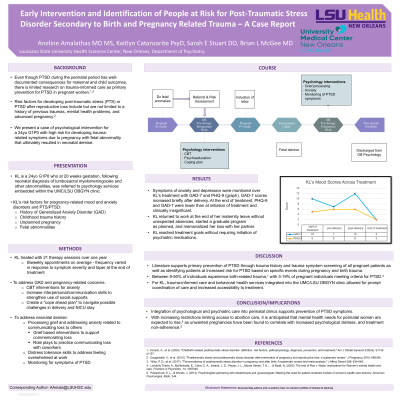Women's Mental Health
(226) Early intervention and identification of people at risk for post-traumatic stress disorder secondary to birth- and pregnancy-related trauma – a case report

- AA
Aneline Amalathas, MD MS
Resident Physician
Louisiana State University Health Science Center - New Orleans, Department of Psychiatry
New Orleans, Louisiana 
Kaitlyn Catanzarite, Psy.D.
Psychology Post-doctoral Fellow
Louisiana State University Health Sciences Center - New Orleans
Metairie, Louisiana
Brian L. McGee, MD
Assistant Professor
Louisiana State Health Science Center
New Orleans, Louisiana
Sarah E. Stuart, DO
Assistant Professor
Louisiana State University Health Sciences Center
New Orleans, Louisiana
Presenting Author(s)
Co-Author(s)
Background/significance: Trauma-informed care throughout pregnancy, as detailed by Horsch et al (2024), has been identified as a means of primary prevention of post traumatic stress disorder (PTSD) in pregnant women, though the literature is scarce on systematic implementation of such care. We present a case of psychological intervention for a 24 year old G1P0 with high risk for developing trauma-related symptoms due to pregnancy with fetal abnormality that ultimately resulted in neonatal demise.
Case: KL is a 24 year old G1P0 who at 20-weeks gestation following neonatal diagnosis of lumbosacral myelomeningocele and other abnormalities was referred to the psychologist embedded within the obstetric clinic. Induction of labor due to non-reassuring fetal heart tones with cesarean occurred at 39 weeks with neonatal demise due to hypoplastic lungs two days later. KL identified as increased risk for PTSD due to the fetal abnormalities, a history of anxiety disorder and ongoing high-risk pregnancy. She underwent trauma-informed psychological interventions during pregnancy (CBT for anxiety) and specific interventions relating to being pregnant (psychoeducation, coping plan for NICU, etc). During the postpartum period, she continued with the psychologist at the obstetric clinic with interventions for anxiety, grief processing and monitoring for development of PTSD. She had an initial GAD7 of 10 and PHQ9 of 5; her highest postpartum GAD7 was 12 and PHQ9 was 6. Based on her decrease of anxiety symptoms and completion of treatment goals, the psychology treatment was tapered with eventual release from clinic.
Discussion: Literature supports primary prevention of PTSD, through trauma history and trauma symptom screening of all pregnant patients, and identifying patients at increased risk for PTSD based on specific events during pregnancy, as in this case study. For KL, trauma-informed care allowed for her referral to Psychology within the obstetrics clinic, the presence of such a component of integrated prenatal care making such an action possible. In light of Dobbs vs Jackson Women’s Health Organization, it is predicted that mental health needs for perinatal women are expected to rise (Londoño Tobón 2023), as unwanted pregnancies have been found to correlate with increased psychological distress, and treatment non-adherence (Poleschuck 2014).
Conclusion/implications: Integration of psychological and psychiatric care into perinatal care allowed for prevention of PTSD symptoms in the case report described, supporting the need for such multidisciplinary services in order to provide trauma-informed care to pregnant patients and optimize maternal and child outcomes.
References:
- Horsch, A., et al. (2024). "Childbirth-related posttraumatic stress disorder: definition, risk factors, pathophysiology, diagnosis, prevention, and treatment." Am J Obstet Gynecol 230(3s): S1116-s1127.
- Londoño Tobón, A., McNicholas, E., Clare, C. A., Ireland, L. D., Payne, J. L., Moore Simas, T. A., ... & Byatt, N. (2023). The end of Roe v. Wade: implications for Women’s mental health and care. Frontiers in Psychiatry, 14, 1087045.
- Poleschuck, E. L., & Woods, J. (2014). Psychologists partnering with obstetricians and gynecologists: Meeting the need for patient-centered models of women’s health care delivery. American Psychologist, 69(4), 344.
Presentation Eligibility: not previously published or presented.
Diversity, Equity, and Inclusion: This case report focuses on women's mental health, specifically primary prevention of PTSD in pregnant patients, whom have been historically underrepresented in research. This case reports highlights the importance of equitable research and the need for further focus on pregnant patients and women's mental health, particularly on PTSD during pregnancy. In light of the Dobbs ruling, there is likely an increased need for focus on mental health in women of reproductive age, further highlighting the need for equitable research and care.

